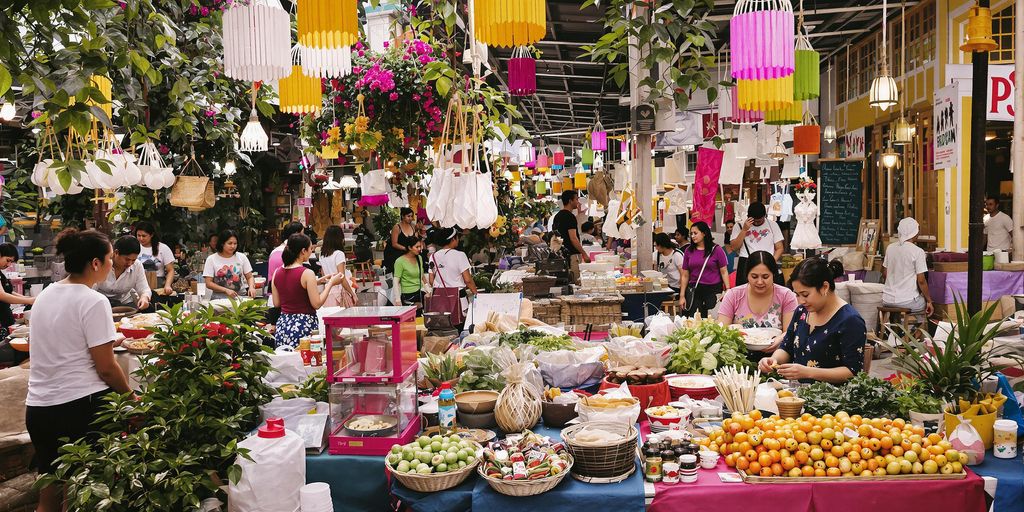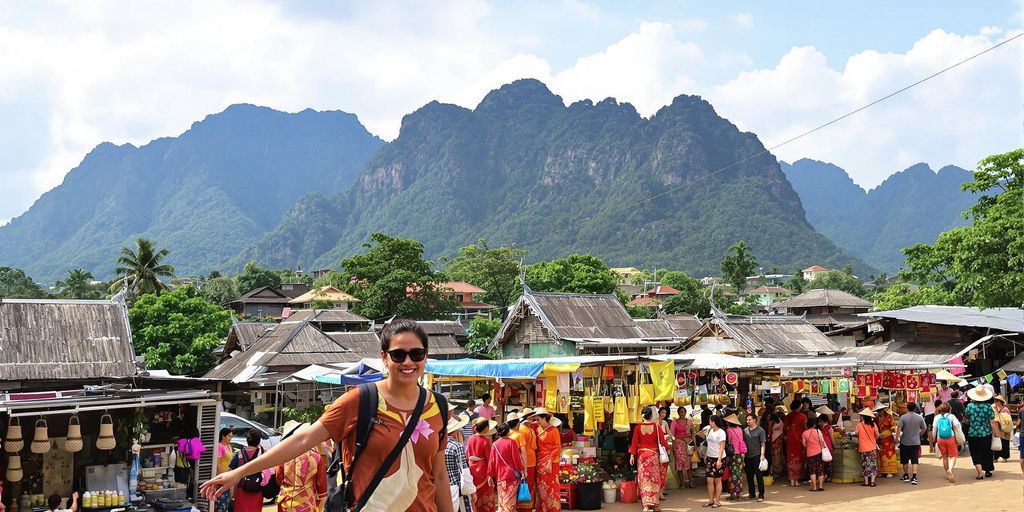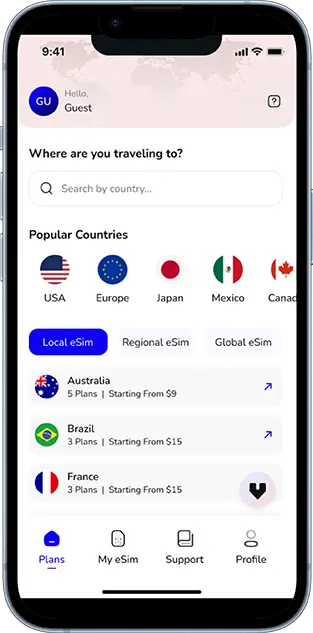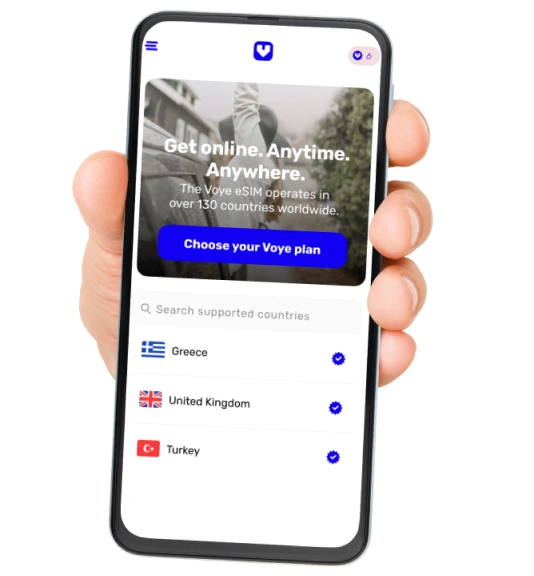Note that iPhone devices from Mainland China aren’t eSIM compatible. Also iPhone devices from Hong Kong and Macao aren’t compatible (except for iPhone 13 Mini, iPhone 12 Mini, iPhone SE 2020 and iPhone XS)
Thailand’s breathtaking landscapes, vibrant culture, and rich biodiversity make it a top travel destination. However, as tourism grows, so do its environmental and social impacts. Sustainable tourism in Thailand focuses on preserving natural resources, supporting local communities, and promoting ethical travel experiences. From eco-friendly accommodations to community-led initiatives, responsible travelers can help protect Thailand’s beauty while enjoying authentic and meaningful adventures.
What Is Sustainable Tourism?
Sustainable tourism is all about ensuring that travel doesn’t come at the expense of the environment, local culture, or communities. It’s about making choices that benefit the places you visit rather than harm them. In Thailand, this means being mindful of how your actions affect the country’s rich ecosystems, historic landmarks, and vibrant communities. By prioritizing sustainable travel experiences in Thailand, you contribute to preserving its beauty for future generations.
The Importance of Responsible Travel
Tourism can have a huge impact—both good and bad. On the negative side, over-tourism can lead to pollution, exploitation of natural resources, and even harm to local traditions. But when done responsibly, travel can support conservation efforts, create jobs, and uplift communities. Thailand’s unique appeal, from its lush jungles to its bustling markets, makes it especially important to tread lightly. Simple actions like avoiding single-use plastics and respecting local customs go a long way.
Thailand’s Commitment to Sustainability
Thailand has made significant strides in promoting green initiatives. From eco-friendly accommodations to community-based tourism projects, the country is working hard to balance its popularity as a travel destination with the need for environmental and cultural preservation. For instance, many hotels now focus on renewable energy and waste reduction. Eco-friendly accommodations are becoming more common, allowing travelers to enjoy their stay while minimizing their footprint. By choosing such options, you’re directly supporting these efforts.
Eco-Friendly Practices for Travelers in Thailand

Reducing Plastic Waste During Your Trip
Plastic pollution is a big issue in Thailand, especially in tourist-heavy areas. Carrying a reusable water bottle and shopping bag can go a long way in cutting down single-use plastics. Many shops and cafes in Thailand are now happy to refill your bottle, and some even offer discounts for doing so. For those moments when you need utensils, consider bringing a small travel kit with bamboo or metal alternatives.
Choosing Green Accommodations
When it comes to where you stay, look for hotels or guesthouses that prioritize sustainability. This might mean they use renewable energy, minimize water waste, or support local communities. Eco-resorts are becoming more common in Thailand, and they often provide an authentic experience while sticking to green tourism practices. Bonus tip: Check reviews to see if their claims match up with reality.
Participating in Low-Impact Activities
Not all activities are created equal when it comes to their environmental impact. Opt for things like hiking, kayaking, or cycling instead of motorized tours. These activities for solo travelers in Thailand not only reduce your carbon footprint but also allow you to connect more deeply with Thailand’s natural beauty. Plus, they’re usually quieter, which means less disruption to wildlife. Always stick to marked trails and follow posted guidelines to ensure you’re practicing responsible travel in Thailand.
Stay Connected While Travelling Solo
Stay online in Thailand with instant activation.
Making small, thoughtful choices during your trip can help preserve Thailand’s beauty for future generations. Each step toward eco-friendly travel tips Thailand brings us closer to a more sustainable future.
Supporting Local Communities Through Tourism

The Benefits of Choosing Local Tour Operators
When you book tours with local operators, you’re doing more than just hiring a guide. You’re directly supporting small businesses and families, helping them thrive in a competitive tourism industry. Local guides often have insider knowledge of the area, sharing stories and traditions that make your visit more meaningful. Plus, they can recommend hidden spots or authentic restaurants that larger companies might overlook. If you’re exploring hill tribe regions in northern Thailand, for example, hiring a local guide ensures your money stays in the community and promotes ethical tourism practices. Ensure you fulfill all the Visa Requirements before coming to Thailand.
How to Engage in Community-Based Tourism?
Community-based tourism (CBT) is a fantastic way to connect with locals while giving back. In places like Phuket, you can stay in a homestay with a Thai family, learning to cook traditional meals or make handicrafts. These experiences not only provide an authentic cultural exchange but also channel profits directly to the community. Activities like these let locals decide how to use the income, whether it’s for education, infrastructure, or preserving cultural heritage. It’s a win-win for budget-friendly Thailand travelers and hosts alike.
Shopping Locally and Ethically
Markets in Bangkok, Thailand are colorful and tempting, but it’s worth taking a moment to think about what you’re buying. Opt for handmade goods and locally sourced products instead of mass-produced souvenirs. This way, you’re supporting artisans and small businesses rather than big factories. Look for items like woven textiles, pottery, or organic food products. Not only do these make unique keepsakes, but they also have a story behind them—one that supports a sustainable economy.
Ethical Wildlife Tourism in Thailand

Visiting Ethical Elephant Sanctuaries
Thailand has a rich history intertwined with elephants, but not all tourist experiences involving these majestic creatures are ethical. Avoid attractions that promote elephant rides or performances, as these often involve harmful practices. Instead, opt for sanctuaries like Elephant Hills, which focus on free-roaming elephants and visitor education. These sanctuaries follow ethical tourism guidelines Thailand has been striving to implement, ensuring both animal welfare and a meaningful experience for visitors.
Avoiding Exploitative Animal Attractions
Not all wildlife attractions in Thailand have the animals’ best interests at heart. To ensure your visit supports conservation rather than exploitation:
- Skip tiger temples or places offering photo ops with sedated animals.
- Avoid “street beggar” elephants, often found in cities under poor conditions.
- Research and choose facilities with transparent welfare policies.
Promoting Wildlife Conservation Efforts
When planning your trip, consider how your choices can contribute to conservation. Here are a few ideas:
- Donate to reputable wildlife organizations in Thailand.
- Participate in eco-volunteering programs focused on preserving natural habitats.
- Support businesses that prioritize sustainability and ethical practices.
Responsible tourism isn’t just about seeing wildlife; it’s about protecting it for future generations. Every small choice you make while traveling can have a lasting impact.
Exploring Thailand’s Natural Wonders Responsibly

Guidelines for Visiting National Parks
Thailand’s national parks are some of the most beautiful in the world, but they need our care. Always stick to marked trails to avoid damaging fragile ecosystems. Tossing trash in designated bins might seem small, but it’s huge for preserving these areas. If you’re planning to camp, check ahead for rules and permits—some parks limit visitors to protect wildlife. And one more thing: loud noises? Not cool. They stress animals and ruin the peace for everyone.
Eco-Tourism Activities in Thailand
Eco-tourism isn’t just a buzzword; it’s a way to explore while giving back. Kayaking through mangroves, hiking with local guides, or even birdwatching can be low-impact and super rewarding. Want to take it up a notch? Look for tours that actively contribute to conservation. A lot of operators reinvest in the environment or local communities. For a mix of adventure and responsibility, consider adding eco-friendly activities to your Thailand travel itinerary.
Protecting Marine Ecosystems
Thailand’s islands, beaches, and coral reefs are stunning but under threat. Start by skipping single-use plastics—those straws and bags often end up in the ocean. When snorkeling or diving, avoid touching corals; even a small touch can harm them. Some sunscreens contain chemicals that are toxic to marine life, so opt for reef-safe options. Lastly, if you see litter on the beach, pick it up. Small actions ripple into big changes for marine life.
Cultural Sensitivity and Respectful Travel

Understanding Thai Customs and Traditions
Thailand is a country rich in traditions, many of which are deeply rooted in religion and family values. Showing respect for these customs is not just polite—it’s essential for a meaningful travel experience. For example, it’s customary to greet others with a wai, a slight bow with hands pressed together, instead of a handshake. Always remember to remove your shoes before entering someone’s home or a temple. These small gestures show your respect for Thai culture.
Coverage in Thailand at Local Rates
Experience hassle-free connectivity in Thailand wherever you go.
Dressing Appropriately at Sacred Sites
When visiting temples or other sacred locations, it’s important to dress modestly. This usually means covering your shoulders and knees. A light scarf or sarong can be a lifesaver if you’re wearing something sleeveless or shorts. Dressing respectfully not only honors the sanctity of these sites but also avoids any uncomfortable situations.
Interacting Respectfully with Locals
Thais are known for their warmth and hospitality, but there are a few cultural norms to keep in mind. Avoid touching anyone on the head—it’s considered the most sacred part of the body. Similarly, pointing your feet at someone or at religious objects is seen as disrespectful because feet are considered the lowest part of the body. A little mindfulness goes a long way in creating positive interactions.
The Role of Technology in Sustainable Travel

Using eSIM Technology for Eco-Friendly Connectivity
Staying connected while traveling has never been easier—or greener. With eSIM technology, you can skip the hassle of physical SIM cards and reduce electronic waste. This small change can make a big difference, especially when traveling through eco-conscious destinations like Thailand. Many Thailand eSIMs offer affordable and reliable global coverage, so you can stay connected without the need for plastic SIM cards or excessive packaging. Plus, you avoid those crazy roaming charges, which is always a win.
Apps to Help You Travel Sustainably
Your smartphone can be a powerful tool for responsible travel. Here are some apps that can help:
- Carbon Footprint Calculators: Apps like these let you measure and offset the emissions from your flights and other activities.
- Eco-Friendly Accommodations: Use platforms that specialize in listing green hotels and lodges.
- Local Guides and Maps: Skip printed materials and use digital guides to find eco-friendly dining, attractions, and transport options.
Having these tools in your pocket makes it easier to make informed, sustainable choices on the go.
Digital Tools for Reducing Your Carbon Footprint
Technology isn’t just about convenience; it can also help you travel lighter on the planet. For instance:
- Virtual Tickets and Itineraries: Ditch the paper and go fully digital with your travel plans.
- Ride-sharing apps: Share rides with others to cut down on emissions.
- Energy-Saving Settings: Many devices now offer modes that reduce energy consumption, extending battery life and cutting down on electricity usage.
Technology isn’t the solution to all our environmental challenges, but it’s a solid ally. By using the right tools, we can make travel more sustainable without giving up the joys of exploring new places.
Technology plays a big part in making travel better for the planet. With tools like apps for planning trips and smart devices that help us use less energy, we can explore the world while being kind to it.
Wrapping Up: Travel Responsibly in Thailand
Traveling sustainably in Thailand isn’t just about checking off a list of eco-friendly tips—it’s about being mindful of the impact you leave behind. From supporting local businesses to respecting the environment and wildlife, every small choice adds up. Thailand’s beauty is unmatched, and by traveling responsibly, you’re helping to preserve it for generations to come. So pack your reusable water bottle, choose ethical tours, and embrace the journey with care. The memories you make will be even more meaningful when you know you’ve done your part to protect this incredible destination.
Seamless Mobile Data Everywhere
















